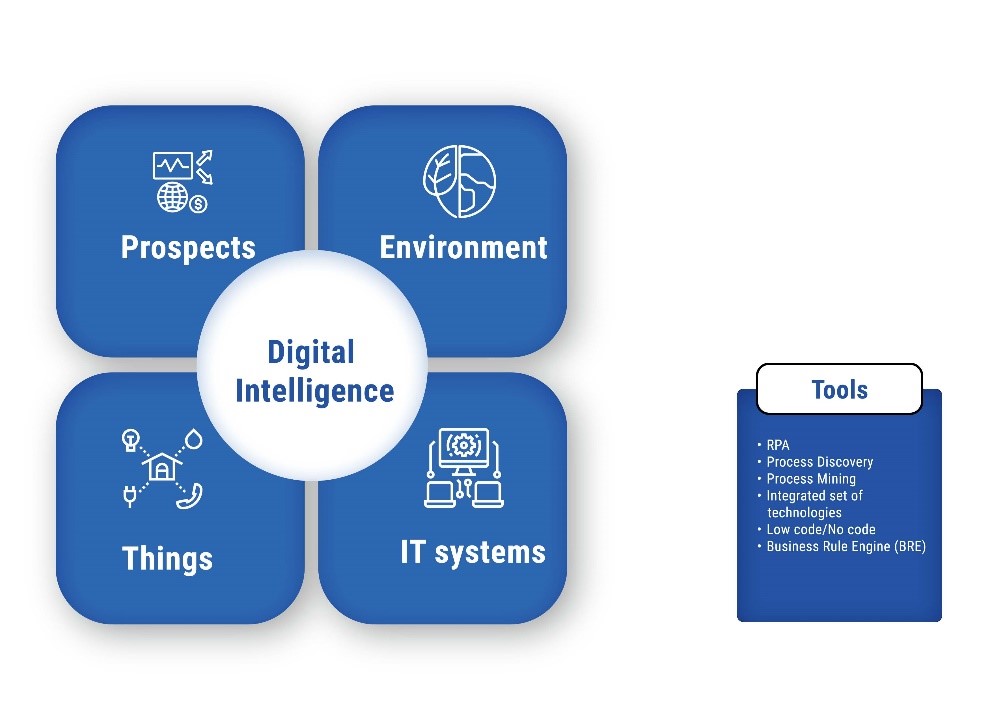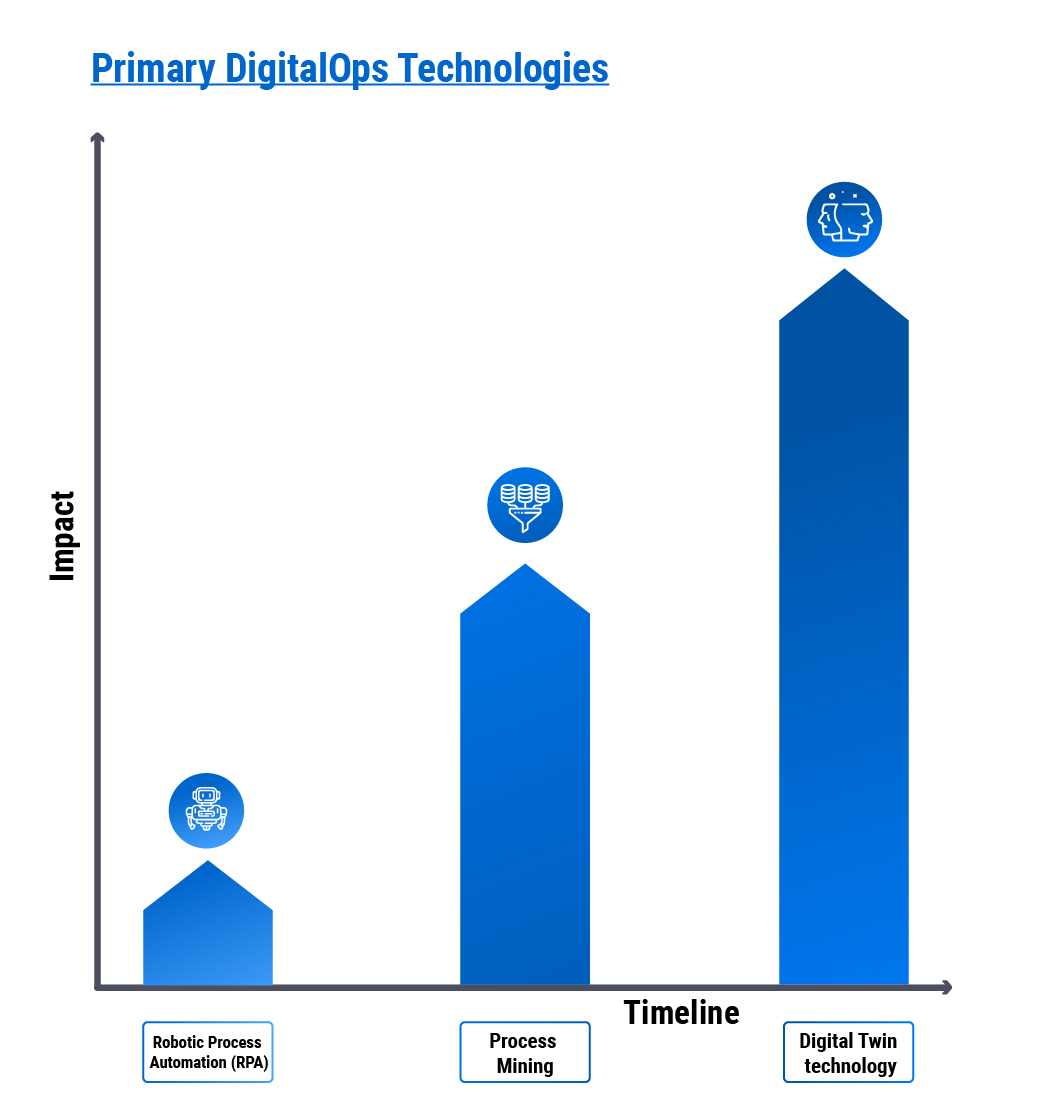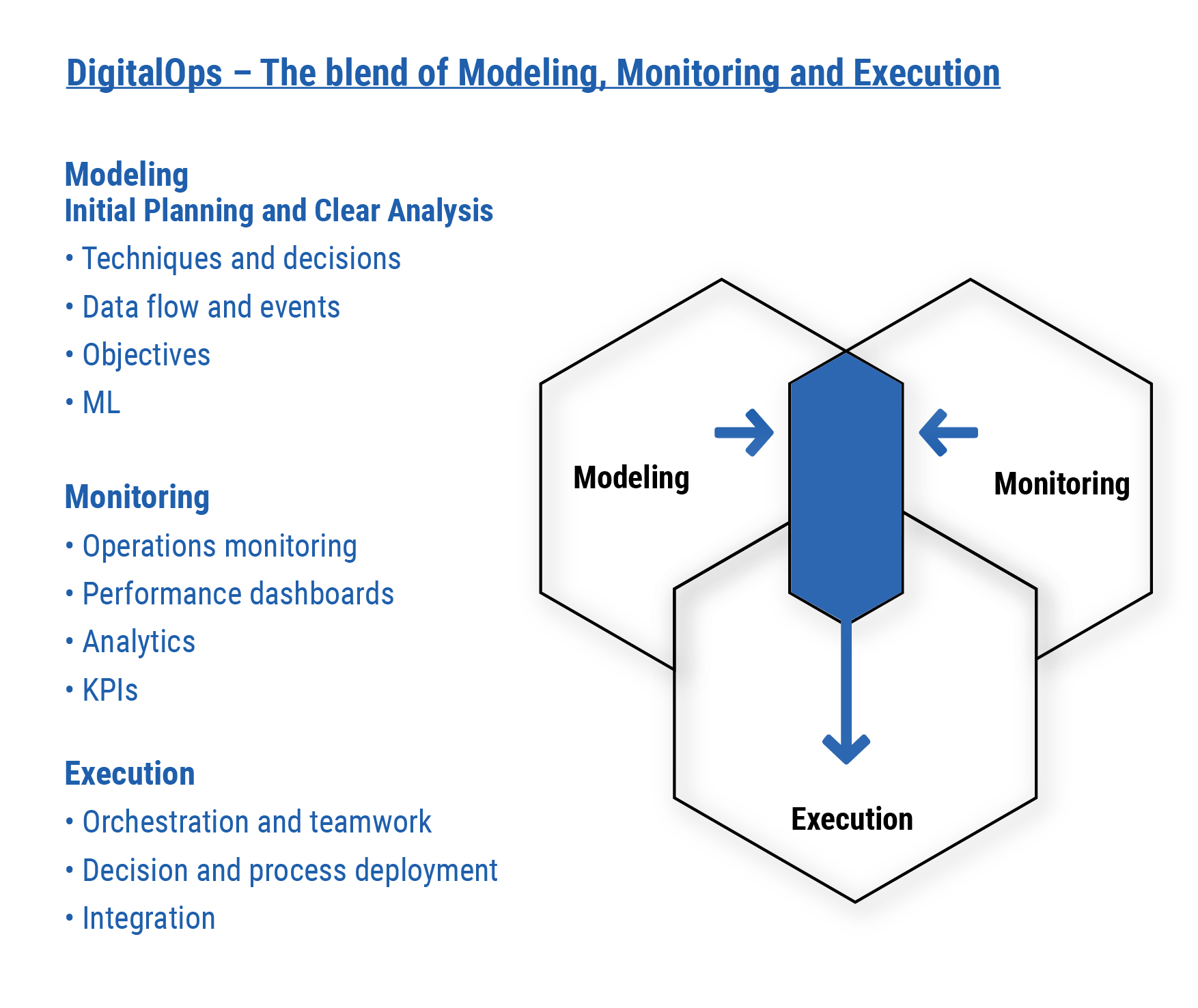
All-In-One Scriptless Test Automation Solution!
All-In-One Scriptless Test Automation Solution!
DigitalOps Initiatives
Reignite your reconfigurable business operations
By 2025, 50% of enterprises will implement at least one of three DigitalOps technologies — RPA, process mining or digital twin of an organization — and therefore significantly increase operational resilience with reduced cost.
-Gartner
Due to the emergence of modern technologies and post-pandemic outbreaks, businesses that lack enough expertise in digital technology stacks are fighting to resume normal business operations. Digital operations streamline the process efficiency with agility, automation, and intelligence. Organizations are considering DigitalOps to achieve process excellence incorporating low code environments and Artificial Intelligence (AI) to supercharge their business processes. As a result, the maturity of Digital Operations has become the key area for business transformation and growth. Despite financial curbs, every organization turns towards digital ops initiatives to drive business transformation through technology innovation.
Before moving forward, business leaders should
DigitalOps is emerging gradually to take a strong lead in accelerating delivery. Businesses looking to improve on ways of defining the value of IT investments such as ROI and TCO have started to leverage digital operations as it delivers exceptional customer experience and business agility. Moreover, it fuels the success of your digital transformation journey, and why not? It brings several benefits to an enterprise, including enhanced productivity, resiliency, cost benefits, improved collaboration, business efficiency, and efficient IT services/solutions.
Exchange and access data across the entire value chain without worrying about accessibility challenges. Teams can get on-demand changes from customers regularly and make faster decisions.
Collaboration with stakeholders builds a strong customer relationship.
It aligns everyone in the same channel and enables them to brainstorm new ideas and achieve their goals.
DigitalOps ensures business continuity by helping organizations manage necessary functions during and after a disaster. It aims to prevent interruptions to mission-critical solutions and quickly set up complete functions for the enterprise.

Organizations face the below challenges when moving up to DigitalOps initiatives.
How will you organize yourself around the delivery of target experiences aligned with your use cases? Controlling and managing the business operations in a completely new way is another key challenge.
Enterprises manually reconfigure connections between people and systems without a DigitalOps layer. Also, every connection involves tremendous IT resources and takes more time, resulting in minimized benefits of an efficient digital platform strategy. However, with DigitalOps, the scope and value chain have grown significantly and opened more automation opportunities.
Adding to that, DigitalOps is a process-centric way of assuming that:

As the world shift towards the new normal, businesses will undergo response, recovery, and renewal stages. However, the focus will be on cost optimization for all phases. Most cost optimization initiatives focus on business outcomes configured with individual functions, operations, or solutions.
Analyze your organization’s operating model to lessen end-to-end business operating costs.
Leverage a digital twin of the enterprise as an architecture pattern to explore cost optimization opportunities across the company.
The digital twin is a dynamic software framework of a company. It leans on operational or other data to realize how an enterprise:
Digital twin highlights the dependencies between processes, functions, and KPIs. It streamlines the planning-to-implementation phase, supports accountability, and helps minimize hurdles for cost optimization initiatives. DigitalOps blended with modeling, monitoring, and execution offers an optimized management model for long-term, enterprise-level cost optimization.
Drive business cost optimization with the below factors

Many businesses have already started using modeling, monitoring, and execution instead of dealing with them individually.
Identify the required and best-fit use cases for which RPA is effective before adopting it. Analyze, and prioritize the offerings suitable for RPA since RPA will not be required for every task. (For example, wherever decision-making is needed, RPA cannot fit in). Establish a CoE and analyze your selection criteria as your enterprise’s level of maturity, expertise, and investment in RPA grows. This ensures the success rate of RPA in production.
RPA is used in various industries
The process mining technology helps you identify, monitor, and enhance processes through knowledge extraction from event logs. An algorithm is applied to the gathered event logs to create models and find the actual process and its exceptions.
It automatically adapts, optimizes, alters, automates, or reconfigures the practices, costs, and standards to enhance operational efficiency and resilience.
Organizations can leverage process mining to maximize operational resilience in tasks such as real-time cash flow monitoring, finding bottlenecks in sales orders and reports, and much more.
We select the language that reflects the company’s business capabilities and adopts processes and outcomes based on the customer’s requirements. This helps us align our thinking around the shared perspectives of our service offerings.
We build compelling digital customer experiences for our products and services and discover opportunities for personalized communications.
Our strategy helps you excel in your digital capabilities:
We help identify quick wins and optimize your business processes and operations through Low code/No code mechanisms.
With the powerful RPA technology, we help automate time-consuming and rules-based office tasks more effectively by minimizing delivery time and at affordable costs than other automation peers in the market.
Our key capabilities for successful RPA transformation:
Overall, DigitalOps helps join business models efficiently to the digital business platform. The velocity to bring business value and time-to-market are crucial in the competitive digital world. The more agile and quick thinking the enterprises are, the more their competitiveness in the digital space. DigitalOps helps achieve the mission of automated customer experience seamlessly. Organizations need to analyze and identify the digital platform’s bottlenecks of process modeling and automation approaches. Establishing DigitalOps governance around key process-centric model life cycle ensures that management of business models and related solutions effectively and push you ahead of the competition.
Get in touch with us today to excel in your digital journey!
Ready to reignite and reconfigure for a massive success?
We help simplify and accelerate your digital initiatives.
One reply on “DigitalOps Initiatives: Reignite your Reconfigurable Business Operations”
test